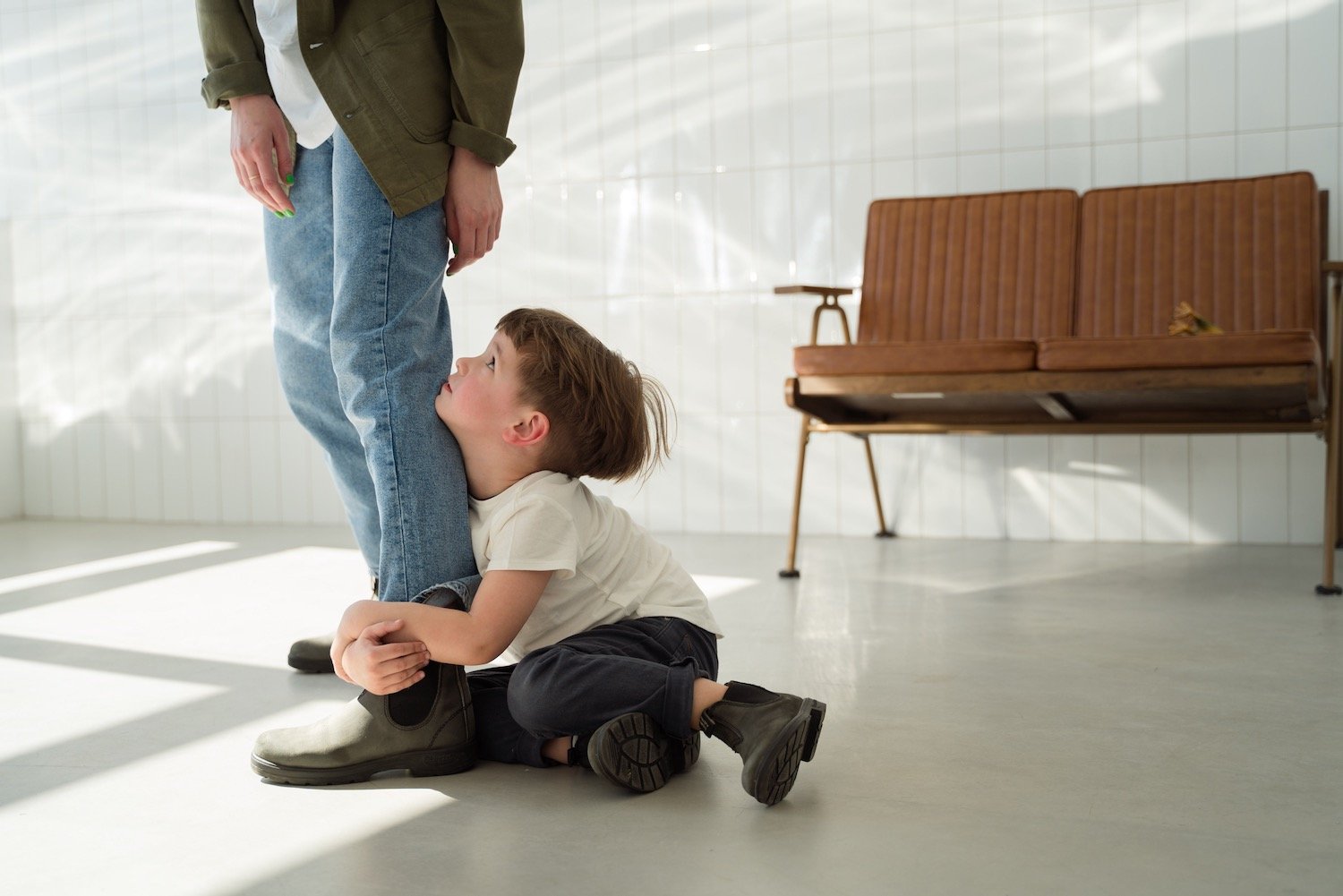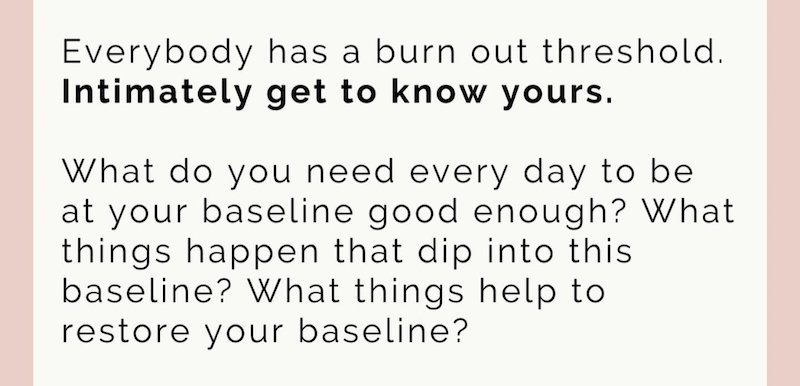5 Life-Changing Tactics To Try When You Desperately Need A Break From Your Kids
by Carolyn Firestone
It’s a funny mix of messaging we get around being a parent today. On the one hand, there’s more advice than ever, telling us things like: Be present…but not intrusive. Nurturing…but not indulgent. Supportive...but not overpraising.
On the other hand, we, the children of the 80s and 90s and the parents of today, can be pretty honest with one another about how incredibly overwhelming it all feels. And how wildly hard it is to live up to all this new, readily accessible advice.
We banter in Facebook groups. Post memes. Tweet funny things. Make snide remarks about how different it was for our parents who didn’t seem to have the same…let’s call it “guilt.”
But as much as we may seek out support (or social media), coping mechanisms (or comedy), very often in the quiet (or the chaos) of daily parenting, we can feel pretty alone. Not always. But when things aren’t going our way and we don’t know how to reconcile our own inflamed emotions with the perfectly contained, ever-modeling parent we hope to be. Then, it’s pretty isolating.
As a parent, nothing is worse than being alone with the thought that we’re falling short of our aim to “be better.” Better than the generations before us. And better than the us of 15 minutes ago - you know when our 6-year-old looked us dead in the eye while pouring modeling clay down the tub drain?
The point is that in these moments, we need something more specific than our larger aspirations. Something to calm us the f down and help us reset. Something that, quite frankly, gives us a break the very instant we so desperately need one.
So, we asked one of our favorite parenting experts, therapist Bryana Kappadakunnel, LMFT of the ConsciousMommy what she suggests. And she gave us 5 thankfully doable things to try.
But before we even get into what these steps are, we need to accept one very important reality:
“It's perfectly normal for parents to need a break from their children.”
“Raising kids (especially if you follow the super-parenting that plagues most of us today) can be really daunting,” said Kappadakunnel, who pointed out that needing and taking breaks was more “normalized” back when we were kids. “Parents have always sought distractions from the intensity of childrearing. Anyone born in the 80s can practically hear their mom saying, ‘Don't bother me, I'm watching my soaps!’”
If you’re an adult whose childhood memories mainly consist of things you did unsupervised, it’s likely because you weren’t supervised all that much.
“I'm not suggesting that these were safe parenting practices. I'm simply saying there was much less guilt on parents (especially moms) who talked on their cord phones for hours while their children watched non-educational cartoons for a distinctly long period of time,” said Kappadakunnel.
Of course, it’s great that we as parents are trying to improve upon our past and pay more attention to what our kids need from us. But chances are, if you’re even reading this article, you care a lot about doing right by your kids. So, it’s okay to shut off the stream of ever-flowing guilt.
And instead, the next time you come up against that feeling like you just cannot stand one more second of your child’s tantrums/whining/demands/requests/constant need to be entertained, try this:
1. THE PLAYLIST
We’re serious. If you notice you’re feeling especially reactive, Kappadakunnel recommends putting on music that puts you in a good mood, preferably “a throwback playlist of songs that remind you of the days when you had no responsibilities.”
It may not sound like it would work, but just think of all the times you’ve been in your car or at the grocery store and a song comes on that completely alters your outlook. “Music is an incredible way to lighten the load, create some distance between pressures of parenting and your true self, and feel physically better in your body,” said Kappadakunnel. “And if your kids insist on changing it to music they like, invite them to go listen to music somewhere else. It's okay to prioritize your personal tastes - especially if it's something you need!”
2. THE WALK
We know. If only we could look our paint-covered 8-year-old or screaming toddler in the eye and say, “I’m gonna take a walk to clear my head,” this whole parenting thing would already be 20x easier.
As challenging as it may feel to squeeze into a hectic day, “movement, especially walking, is proven to have long-lasting mental health benefits,” according to Kappadakunnel. “If you can't get out of the house by yourself, try putting on some headphones and power walking around your house. Your kids may give you the side-eye. (Or, if they're like mine, they'll follow you around to get their 'steps' in.) But your job is to focus on you. Get your heartrate up a little bit. Get your blood pumping. It will clear your mind, and you will most likely feel physically better. Even a brisk 5-minute walk can have tremendous benefits.”
3. THE 5 SENSES
Yes, this is exactly what it sounds like: a “basic mindfulness technique that tunes you into your body in the present moment,” and it happens to be “highly effective for regulating anxiety and depression,” said Kappadakunnel.
Most parents’ chief complaint is a lack of quiet time to themselves, but Kappadakunnel points out that “all you have to do is check in with your five senses. What's one thing you can hear? See? Taste? Touch? Smell? This tool also helps you learn to dial down the general noise and chaos that surrounds you on the daily.”
4. THE PHONE-A-FRIEND
“It’s okay if your kids see you talking on the phone with someone you care about,” said Kappadakunnel. “In today's parenting conversations, we're led to believe that we must be all in with our attention at every moment we're with our kids. This is simply not accurate. It's a great thing for your kids to see you nourishing your important relationships, breaking up the mundane daily tasks by chatting with the people you care about, and getting support when you need it.”
5. THE TIME LIMIT
Ok, not sure what you’ll think, but this tip felt like an actual gift. “Put a time limit on how much you're willing to play,” said Kappadakunnel. “And if you're not into acting out dramatic scenes, that's okay, too.” So, how do you get your Energizer bunny/ dramatic actor of a 4-year-old to let you relax a bit while they play an involved, imaginative game?
“See if there's a role you can play laying down,” said Kappadakunnel. “Or see if you can play the person in the audience who watches, laughs, and claps.”
Basically, and in general, it’s okay to carve out moments of regeneration. “If every minute of your day is spoken for between being with the kids, taking care of house stuff, partner things, and work responsibilities, please re-prioritize your time to include daily fun,” said Kappadakunnel.
While we’re going to fall short at times, as parents we can at least aim for a headspace that’s open to the spectrum of joys and peppered-in pleasures that come our way on an ongoing basis. “We seem to believe that play time needs to be earned,” said Kappadakunnel. “Life is about pleasure. And when we are unable to access pleasure, it's because we are over-worked. We are doing too much. We are too tired. Too resentful.”
Obviously, Kappadakunnel acknowledges that addressing all this can involve bigger objectives like re-evaluating our schedules and taking things off the calendar, but part of relieving our own triggered stress response means being more intentional about allowing ourselves to have and enjoy both the “breaks you take from your kids” and “the time you share together.”
In other words, do whatever it takes to give yourself the breathing room to delight in the small moments, because it makes us more resilient throughout the trying ones.
carolyn firestone
Carolyn is a freelance writer and editor. Her favorite thing to do is to write about her favorite things, especially when they have even the slightest chance of making someone else’s something (mood, relationship, travel plans, or toiletry kit) a little better. You can find more of her articles here.
This article is for informational purposes only. It is not intended to be used in place of professional advice, medical treatment, or professional care in any way. This article is not intended to be and should not be a substitute for professional care, advice or treatment. Please consult with your physician or healthcare provider before changing any health regimen. This article is not intended to diagnose, treat, or prevent disease of any kind. Read our Terms & Conditions and Privacy Policy.













